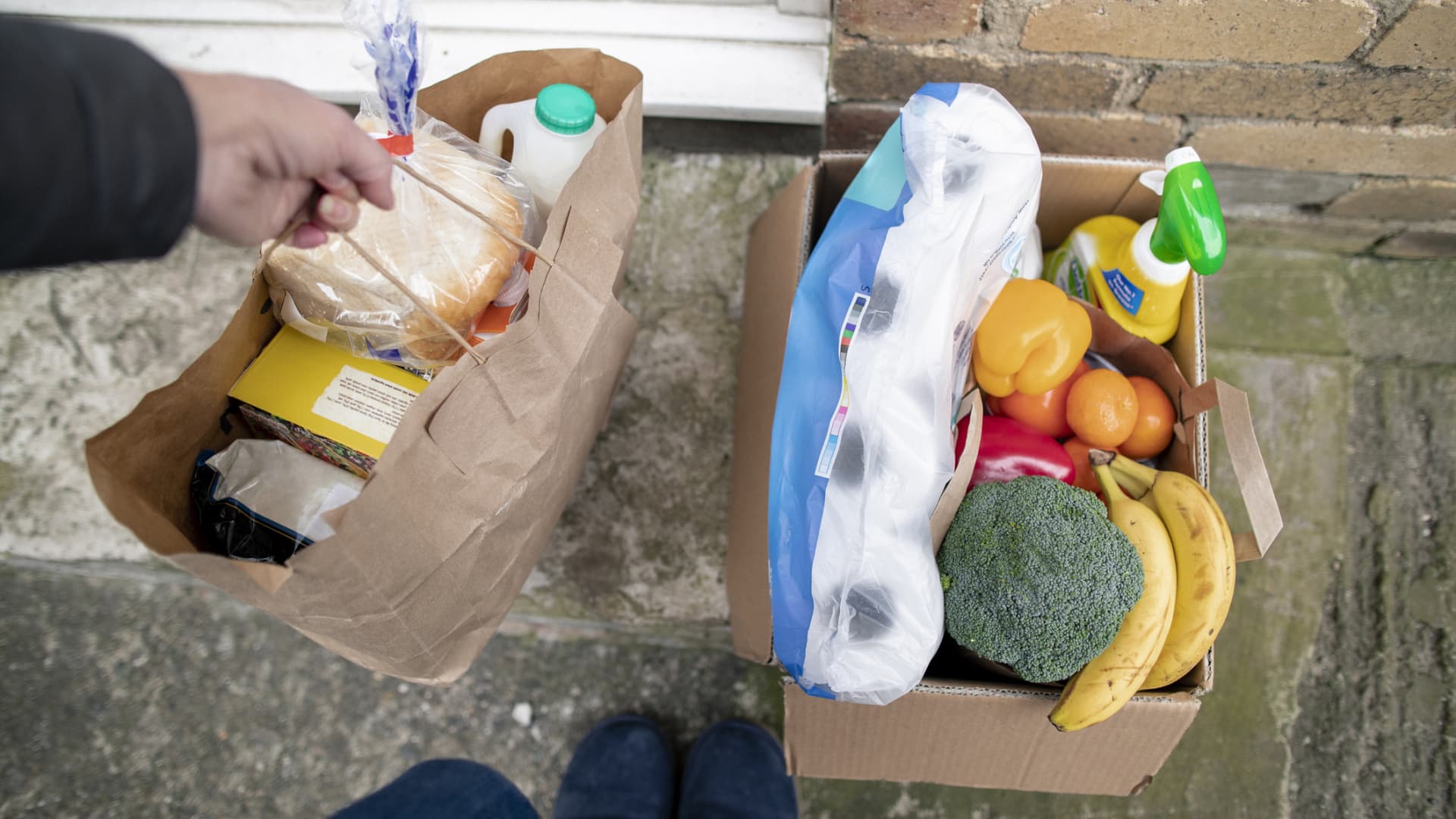As retailers compete for grocery shoppers, some of the big names in the business have zeroed in on the same strategy: get deliveries to customers’ doors quickly.
This week, Target announced a new paid membership program with free same-day home deliveries as a key perk. Walmart expanded its same-day delivery offering to allow shoppers to get online purchases dropped off earlier in the morning.
And Kroger said Thursday that home deliveries helped propel its more than 10% year-over-year growth in digital sales and 24% year-over-year jump in delivery sales in the most recent quarter.
With same-day deliveries, the three retailers are not only trying to outmatch one another on convenience. They’re also turning brick-and-mortar locations — and the short distance to customers’ homes — into their biggest advantage over Amazon and other e-commerce players, said Michael Baker, a retail analyst for D.A. Davidson.
“This, over the last few years, has completely flipped the switch and turned stores into an asset,” he said.
Walmart is the largest grocer in the U.S., with 23.6% of market share in 2023, according to Numerator, a market research firm. Kroger is second, with 10.1% of market share. Target is the ninth largest grocer by market share, with 2.7%, the firm estimated.
With Target’s announcement this week, Walmart, Target and Kroger will all have paid membership programs with home deliveries as one of the benefits. The subscription services have similar price points and minimums, such as requiring customers to spend at least $35, to get goods dropped at their homes.
Target Circle 360, which launches in early April, will cost $99 per year, but will be $49 for customers who have the retailer’s credit card and for those who sign up during a promotion timed for the program’s launch.
Walmart+ costs $98 per year or $12.95 on a monthly basis, with perks like gas discounts along with free shipping and free grocery deliveries. And Kroger has a program called Boost, which has a $59 per year and $99 per year option. The higher-priced plan includes free delivery within two hours on all orders of $35 or more.
Walmart and Kroger have not shared how many subscribers they have. Target said it has more than 100 million members of Target Circle, its free loyalty program, but it’s unclear how many will sign up for Target Circle 360.
Each of the retailers have tried to stand out from the pack. Target, for example, said it can deliver some online orders in as little as an hour. Walmart said Thursday that it will start making on-demand deliveries as early as 6 a.m. local time. It previously started them at 8 a.m.
Membership programs help offset delivery and shipping costs by charging fees, but they also allow retailers to collect more customer data that can be used to personalize offers or support their growing advertising businesses, D.A. Davidson’s Baker said. They can help drive more frequent online orders, too.
For Walmart, the services are a way to compete in other ways than just price. Walmart CFO John David Rainey has spoken on earnings calls about how Walmart customers are increasingly choosing the big-box retailer for convenience, like its curbside pickup or home delivery options. Those services may also matter more as Walmart tries to retain higher-income shoppers it’s attracted over the past two years while food prices were high.
At Target, same-day deliveries could help to boost sales. The cheap chic retailer’s comparable sales have declined three quarters in a row, and the company expects them to fall again this quarter. It has posted year-over-year digital sales declines for each of the past four quarters.
As customers buy less discretionary merchandise, Target has tried to sell more food and household essentials. Those same items, such as paper towels and cartons of eggs, tend to be the ones that people replenish frequently or need to order in a pinch for a home delivery.
Kroger has used online delivery to break into new regions of the country, including Florida, without opening a single grocery store. It’s built huge fulfillment centers that are powered by automation and robotics from U.K.-based company, Ocado.
On a call with investors on Thursday, Kroger CEO Rodney McMullen described digital as “an important growth accelerator,” and said the company expects another year of double-digit sales growth. He said digital delivered more than $12 billion in sales for 2023. That’s still a small piece of Kroger’s annual revenue, which totaled about $150 billion for the year.
He said digitally engaged customers spend more with Kroger and support growth of its ads business.
McMullen said fierce competition with other grocers, such as Costco and Amazon, has made the grocer race to keep up with customers’ shopping preferences and try to acquire Albertsons. The FTC sued to block that deal last month. He said on the earnings call that Kroger will defend the merger in litigation and expects hearings to start in mid-to-late summer.
He said the company is getting closer to turning its online business into a money maker.
“We’ve always told everybody job one is to make sure we don’t lose the digital customer, and job two is our responsibility to figure out how to make sure that customer is profitable,” he said.
While delivery will help the three retailers overcome unique issues, they still share a common challenge of winning over shoppers who aren’t spending as freely. Walmart and Target both beat Wall Street’s sales expectations for the holiday quarter, but said shoppers are still very value-focused.
Even as Kroger’s shares rose on Thursday, McMullen echoed that on the company’s earnings call.
“They [customers] tell us they’re feeling better more so than their behavior is changing so far,” he said.
